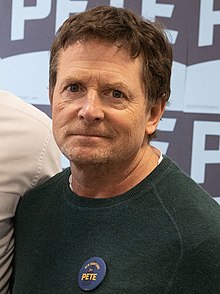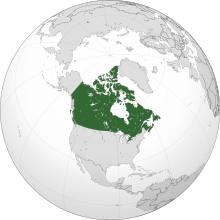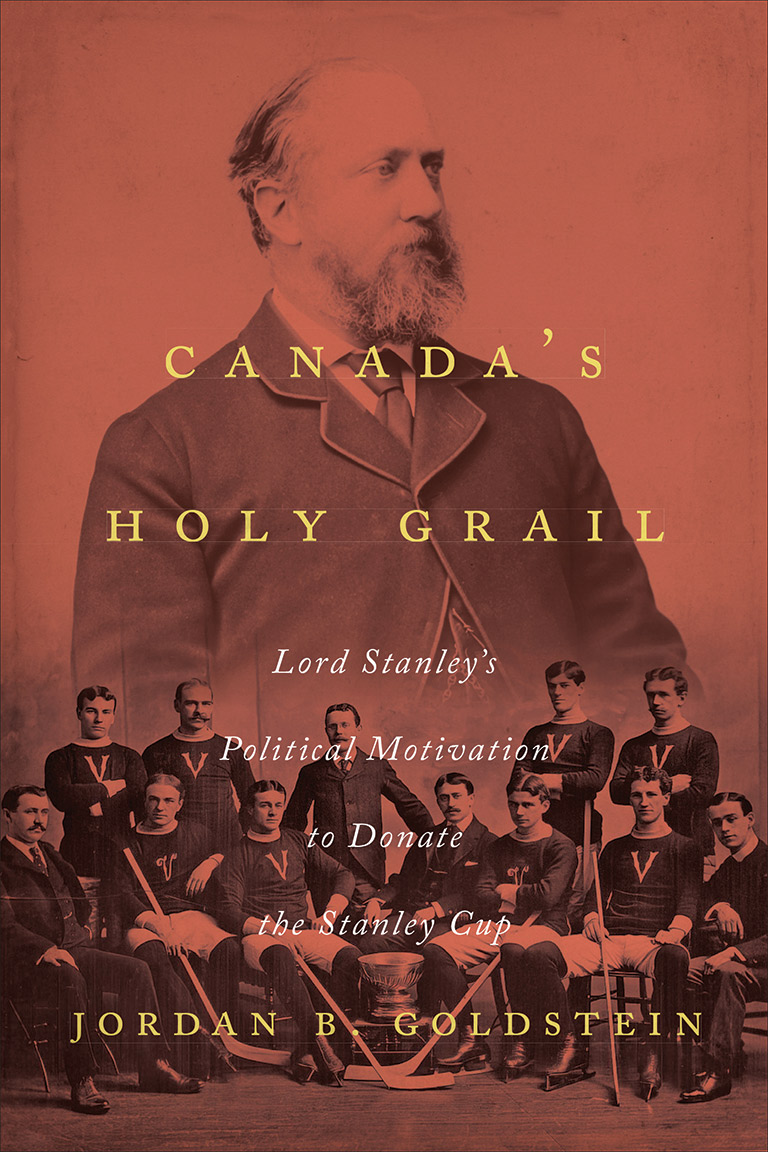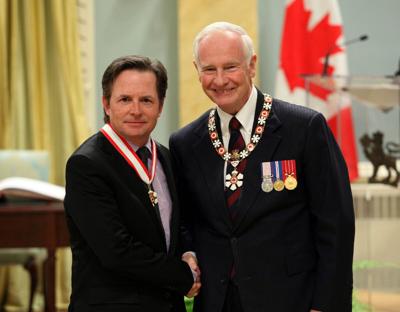|
|
General: MICHAEL ANDREW "JAMES" FOX CANADIAN-AMERICAN ACTOR EDMONTON ALBERTA
Escolher outro painel de mensagens |
|
|
Michael J. Fox
|
Michael J. Fox
|

Fox in February 2020
|
| Born |
Michael Andrew Fox
June 9, 1961 (age 63)
|
| Citizenship |
[1] |
| Occupations |
- Actor
- author
- producer
- activist
- comedian
|
| Years active |
1978–2021 |
| Height |
5 ft 4 in (1.63 m)[2] |
| Spouse |
|
| Children |
4 |
| Relatives |
Matthew Fox (possible cousin) |
Michael Andrew Fox OC (born June 9, 1961), known professionally as Michael J. Fox, is a retired Canadian-American actor, author, comedian, movie producer and activist with a film and television career spanning from the 1970s to 2020. He played Marty McFly in Back to the Future trilogy. On television, he played Alex P. Keaton in the NBC sitcom Family Ties and Mike Flaherty on the ABC sitcom Spin City. He has won five Primetime Emmy Awards, four Golden Globe Awards, a Grammy Award and two Screen Actors Guild Awards.
Fox was diagnosed with Parkinson's disease in 1991, and told the public about it in 1998. He semi-retired from acting in 2000 as the symptoms of the disease worsened. He has since become an advocate for research toward finding a cure, and founded the Michael J. Fox Foundation. Sweden's Karolinska Institute gave him an honorary doctorate on March 5, 2010 for his work advocating a cure for Parkinson's disease.
Fox has also worked as a voice-over actor on films, such as Stuart Little and Atlantis: The Lost Empire. On the CBS television show The Good Wife, he earned Emmy nominations for three consecutive years for his recurring role as crafty attorney Louis Canning. He has also taken recurring guest roles and cameo appearances in Boston Legal, Scrubs, Curb Your Enthusiasm, Rescue Me, and Designated Survivor. He has written four books. Fox was appointed an Officer of the Order of Canada in 2010 and was also inducted into Canada's Walk of Fame in 2000.
|
|
|
 Primeira
Primeira
 Anterior
2 a 5 de 5
Seguinte
Anterior
2 a 5 de 5
Seguinte
 Última
Última

|
|
|
|
Canada
|
|
|
Motto: A mari usque ad mare (Latin)
"From Sea to Sea" |
| Anthem: "O Canada"
Duration: 1 minute and 14 seconds.1:14
|
 |
| Capital |
Ottawa
 45°24′N 75°40′W 45°24′N 75°40′W |
| Largest city |
Toronto |
| Official languages |
|
| Demonym(s) |
Canadian |
| Government |
Federal parliamentary constitutional monarchy |
| |
|
|
Charles III |
|
|
Mary Simon |
|
|
Justin Trudeau |
| Legislature |
Parliament |
|
|
Senate |
|
|
House of Commons |
| |
|
|
July 1, 1867 |
|
|
December 11, 1931 |
|
|
April 17, 1982 |
|
• Total area
|
9,984,670 km2 (3,855,100 sq mi) (2nd) |
|
• Water (%)
|
11.76 (2015)[2] |
|
• Total land area
|
9,093,507 km2 (3,511,023 sq mi) |
|
• 2024 Q4 estimate
|
 41,465,298[3] (36th) 41,465,298[3] (36th) |
|
|
 36,991,981[4] 36,991,981[4] |
|
• Density
|
4.2/km2 (10.9/sq mi) (236th) |
| GDP (PPP) |
2024 estimate |
|
• Total
|
 $2.582 trillion[5] (16th) $2.582 trillion[5] (16th) |
|
• Per capita
|
 $62,766[5] (30th) $62,766[5] (30th) |
| GDP (nominal) |
2024 estimate |
|
• Total
|
 $2.215 trillion[5] (9th) $2.215 trillion[5] (9th) |
|
• Per capita
|
 $53,834[5] (18th) $53,834[5] (18th) |
| Gini (2024) |
 29.2[6] 29.2[6]
low inequality |
| HDI (2022) |
 0.935[7] 0.935[7]
very high (18th) |
| Currency |
Canadian dollar ($) (CAD) |
| Time zone |
UTC−3.5 to −8 |
|
|
UTC−2.5 to −7 |
| Calling code |
+1 |
| ISO 3166 code |
CA |
| Internet TLD |
.ca |
|
|
|
|
|
Canada’s Holy Grail: Lord Stanley’s Political Motivation to Donate the Stanley Cup
by Jordan B. Goldstein
University of Toronto Press
341 pages, $32.95
For a hockey-crazy country, it makes sense that hockey’s ultimate award — the Stanley Cup — holds a prominent place in the Canadian psyche. The cup is a Canadian icon, but how did a silver trophy donated by a Governor General in 1892 become a meaningful part of our identity?
According to Jordan B. Goldstein, author of Canada’s Holy Grail: Lord Stanley’s Political Motivation to Donate the Stanley Cup, it was by design. When Lord Frederick Arthur Stanley, Canada’s sixth Governor General, donated the Dominion Hockey Challenge Cup (later known as the Stanley Cup) in March 1892, he set out to foster Canadian unity and nationalism.
“Donating the cup was an attempt on [Stanley’s] part to build a nation through sport. Given that as governor general, he was head of the Canadian state, his act was political. Setting aside that he had a personal interest in ice hockey and desired to promote it, the creation of the Stanley Cup had political implications,” writes Goldstein, a professor in the Department of Kinesiology at Wilfrid Laurier University.
When Stanley served as Governor General from 1888 to 1893, Canada faced two potential outcomes: grow as an independent nation and remain close to Great Britain, or join the United States. He also recognized the division between French and English Canada as well as the difficult and fractious nature of Canadian politics at the time.
While Stanley wanted to help Canada mature, he understood that his role required impartiality, so he approached the task of building unity — an inherently political act — via his mandate of celebrating excellence.
Stanley chose to celebrate hockey. He envisioned a national championship and provided it with an award. “A physical symbol of national ice hockey supremacy would help support the Canadian state by inducing competition across a national system of ice hockey participants and thereby fostering a shared national sentiment,” writes Goldstein.

You could win a free book!
Sign up for any of our newsletters and be eligible to win one of many book prizes available.
In exploring Stanley’s motivation, Goldstein looks at Stanley’s life as it intersected with Canadian history, identity, philosophy, politics, and, of course, sports. He also explains why Stanley thought only hockey could be Canada’s national sport, and not baseball or lacrosse, both of which were popular at the time. Baseball belonged to the United States, while lacrosse — Canada’s national game at the time of Confederation — had lost its appeal as its supporters chose to remain true to the British Amateur Code rather than seeing lacrosse grow as a professional sport.
In short, to understand why Stanley donated the cup, we must also understand his time as Governor General and why, during a time of “national pessimism, especially in terms of national identity and culture,” Canada needed a strong symbol.
Even though Goldstein shares Stanley’s love of hockey, Canada’s Holy Grail is not a light read about the Governor General and his prize. Instead, it involves meticulous analysis that relies on primary and secondary sources. While historical analysis may not be everyone’s silver cup, Goldstein’s research is fascinating, and his book allows readers to understand a unique part of Canada’s history and identity. It also tells us how a trophy donated by a Governor General became an enduring symbol of the country.
As a result, Canada’s Holy Grail is well suited for anyone who loves hockey, Canadian history, and Canadian political thought — and who is not afraid of some intellectual work. In the end, we owe Stanley great thanks for creating a Canadian icon and, at the same time, helping to create a more unified Canada.
https://www.canadashistory.ca/explore/books/canada-s-holy-grail |
|
|
|
|
Governor General David Johnston (right) with actor Michael J.Fox at Rideau Hall on May 27, 2011 during an Order of Canada ceremony.
PATRICK DOYLE / THE CANADIAN PRESS
OTTAWA—Actor Michael J. Fox is now an officer of the Order of Canada.
The Edmonton-born actor and activist is among 43 people who received their medals from Gov. Gen. David Johnston at a Rideau Hall ceremony.
Others include rock legend Robbie Robertson, hockey commentator Howie Meeker, Acadian filmmaker Phil Comeau, former cabinet minister Anne McLellan and Trudeau biographer Stephen Clarkson.
Fox was honoured for his efforts on behalf of those suffering from Parkinson’s disease, as well as his television and film work.
Fox, diagnosed with Parkinson’s two decades ago, called the award a great honour.
He chuckled that he felt like an imposter when he glanced around at his fellow inductees.
“I don’t begin for a second to put myself in the league of any of these people,” he said. “When I listen to what they’ve done, that’s Canadian to me. It’s a seriousness and a sense of humour, it’s a lot of contradictions.”
He said Canada always makes him think “of vast spaces and tight communities.”
“We think of ourselves huddled against the elements and helping each other. It’s very moving to be part of it.”
https://www.thestar.com/entertainment/michael-j-fox-receives-order-of-canada/article_8f612aa5-9d87-5133-9984-8c2b1b3eaa4f.html |
|
|
 Primeira
Primeira
 Anterior
2 a 5 de 5
Seguinte
Anterior
2 a 5 de 5
Seguinte
 Última
Última

|
|
| |
|
|
©2025 - Gabitos - Todos os direitos reservados | |
|
|








